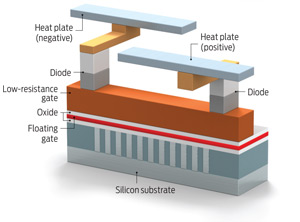Heat Can Heal Dead NAND Flash Cells and Extend Life
Few users may have ever reached the end of life of a flash drive, yet we know that mainstream drives can, realistically, not exceed 100,000 read/write cycles and many cheap flash drives are even rated well below that.
If you are willing to spend money for a high-end drive and a focus on durability, you can approach up to 1 million cycles. However, that's not so much on for a server drive, which may endure more than 1,000 cycles each day.
For extreme cases, there may be a new technology that claims to extend the lifetime of a flash drive to more than 100 million cycles. Even if you were to write and erase data 1,000 times per day, such a drive would last 274 years. Engineers from Macronix developed the technology and said that even 100 million cycles is not the real end. They simply didn't have the resources to test the memory for 1 billion cycles as it would take several months.
The improvement to flash lies in adding onboard heaters to small groups of memory cells, which can in turn heal flash memory cells that degrade over time. In fact, flash memory makers are facing a substantial challenge as this degradation accelerates with smaller cells. However, Macronix said that briefly heating the cell to 800 degrees Celsius can entirely heal the cell, prevent degradation and returning the cell to full operation.
There was no information when the technology could be commercialized.
Contact Us for News Tips, Corrections and Feedback
Get Tom's Hardware's best news and in-depth reviews, straight to your inbox.

Douglas Perry was a freelance writer for Tom's Hardware covering semiconductors, storage technology, quantum computing, and processor power delivery. He has authored several books and is currently an editor for The Oregonian/OregonLive.
-
warezme Is this like all those Nvidia owners with laptops that had the faulty video chips and if they put the mobo in the oven at a certain temperature it would remelt the solder and the chip would start to work again. I had a friend who did it and it worked for a few months and then it quit again and he put it back in the oven a second time and got it work one more time but then the mobo had started to warp and quit after a few more months.Reply -
friskiest And I thought heat is not good for electronics! If heating really does deal flash memory, then that would be great.Reply -
memadmax NICE.Reply
Thats something you would prolly never think of because you think of heat as the number one enemy to silicon. -
djscribbles warezmeIs this like all those Nvidia owners with laptops that had the faulty video chips and if they put the mobo in the oven at a certain temperature it would remelt the solder and the chip would start to work again. I had a friend who did it and it worked for a few months and then it quit again and he put it back in the oven a second time and got it work one more time but then the mobo had started to warp and quit after a few more months.Reply
No, it's nothing like that. -
milktea 800 degrees Celsius is not something I want in my computer or anywhere in my house that I might accidently touch!Reply -
bison88 Finally, something other than super read/write speeds are being addressed in the NAND/SSD sector. The biggest problem has always been reliability and those write cycles have steadily been dropping from SLC > MLC > TLC. Even though controllers have become more advanced it isn't comforting knowing such extremely low limits compared to HDD's, this should help if it ever comes to fruition. Only problem is how the hell you're going to heat it to 800 degrees as this is currently being done cell by cell. There are billions of flash cells.Reply -
amk-aka-Phantom bucknuttyhmm... to bad the oven in my home only goes up to 450.Reply
From Wikipedia: "...with a typical melting range of 90 to 450 °C (190 to 840 °F). It is commonly used in electronics and plumbing, and when manually applied is often done so using a soldering iron or soldering gun. Alloys that melt between 180 and 190 °C (360 and 370 °F) are the most commonly used."
So your oven should be good, though I've heard that you shouldn't heat the card about a certain temperature like 90 °C anyway unless you want to damage the parts that were not rated for higher temps. I probably should do it myself, got an old 8800GT that looks like re-soldering could help it. -
freggo Good to know. Next time the wife bakes cookies I'll slip some old SSD in with 'em.Reply
Fresh cookies AND fresh memory... perfect :)
